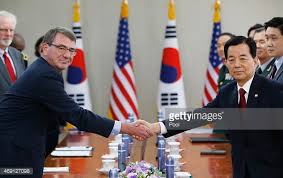US Defense Secretary Ashton Carter on Sunday visited the Demilitarized Zone (DMZ) dividing the Korean peninsula and renewed calls for North Korea to avoid provocations and step away from its nuclear program.
 US Defense Secretary Ashton Carter on Sunday visited the Demilitarized Zone (DMZ) dividing the Korean peninsula and renewed calls for North Korea to avoid provocations and step away from its nuclear program.
US Defense Secretary Ashton Carter on Sunday visited the Demilitarized Zone (DMZ) dividing the Korean peninsula and renewed calls for North Korea to avoid provocations and step away from its nuclear program.
On a brief trip to the heavily mined area that for 60 years has been a buffer between the Koreas, Carter and South Korean Defense Minister Han Min-Koo stood atop a hill known as Observation Post Ouellette -- the closest post to the demarcation line between the two nations.
Carter later said the United States remains committed to the six-party talks process that seeks the denuclearization of the peninsula.
"That remains our policy," he told reporters. "We remain committed to achieving that negotiated outcome with North Korea, and believe that they should be on the path of doing less -- and ultimately zero -- in the nuclear field, not to be doing more."
North Korea has carried out three nuclear tests and has explicitly indicated its intention to carry out a fourth.
It abandoned the six-party talks, which also grouped South Korea, China, Russia, the US and Japan, in April 2009.
"We continue to call on North Korea to maintain peace and stability on the peninsula, avoid provocations, avoid adding to tensions on the peninsula and to take the steps that are called for in the six-party talks to denuclearize the peninsula," the Pentagon chief said.
It was Carter's first visit to the DMZ as defense secretary. Later, he was flying back to Seoul for security talks held annually with South Korean defense leaders.
"Being here shows you up close how dangerous this part of the world is," Carter said at the border village of Panmunjom.
The talks were expected to focus on Seoul's progress in developing the military capacity believed necessary to no longer require the Americans to command South Korean forces in the event of a North Korean invasion.
About 28,500 US troops are stationed in South Korea and the two forces have very close military ties.